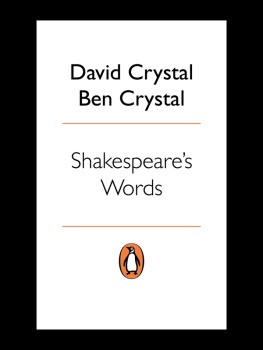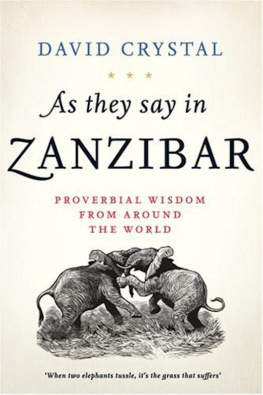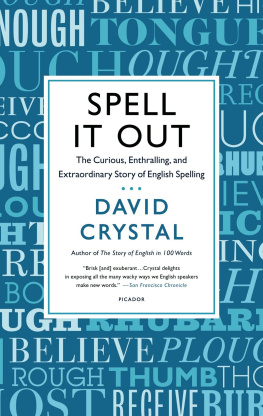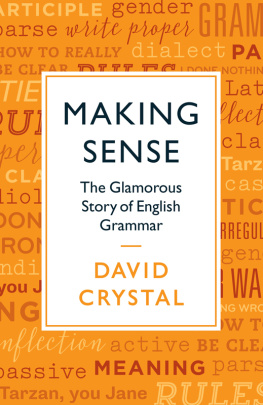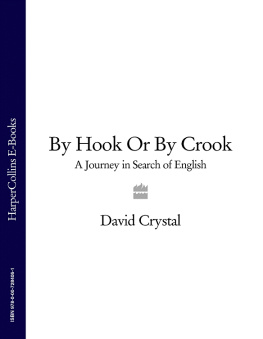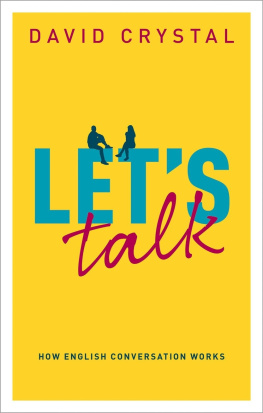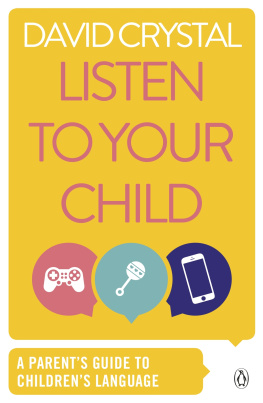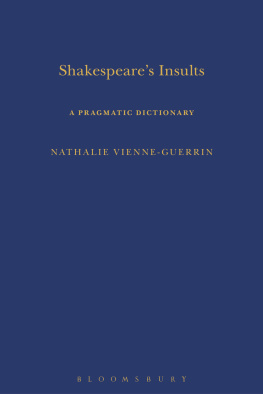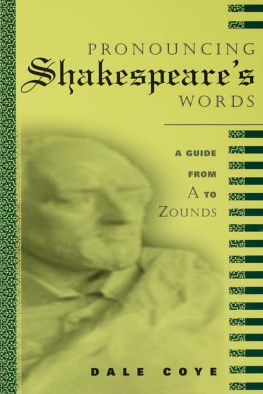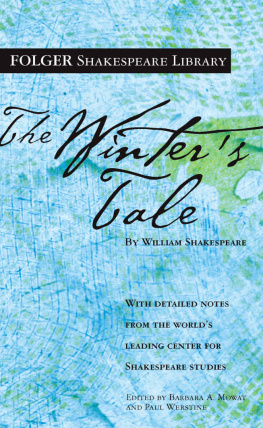David Crystal - Shakespeare’s Words
Here you can read online David Crystal - Shakespeare’s Words full text of the book (entire story) in english for free. Download pdf and epub, get meaning, cover and reviews about this ebook. year: 2013, publisher: Penguin Books Ltd, genre: Children. Description of the work, (preface) as well as reviews are available. Best literature library LitArk.com created for fans of good reading and offers a wide selection of genres:
Romance novel
Science fiction
Adventure
Detective
Science
History
Home and family
Prose
Art
Politics
Computer
Non-fiction
Religion
Business
Children
Humor
Choose a favorite category and find really read worthwhile books. Enjoy immersion in the world of imagination, feel the emotions of the characters or learn something new for yourself, make an fascinating discovery.
- Book:Shakespeare’s Words
- Author:
- Publisher:Penguin Books Ltd
- Genre:
- Year:2013
- Rating:5 / 5
- Favourites:Add to favourites
- Your mark:
- 100
- 1
- 2
- 3
- 4
- 5
Shakespeare’s Words: summary, description and annotation
We offer to read an annotation, description, summary or preface (depends on what the author of the book "Shakespeare’s Words" wrote himself). If you haven't found the necessary information about the book — write in the comments, we will try to find it.
Shakespeare’s Words — read online for free the complete book (whole text) full work
Below is the text of the book, divided by pages. System saving the place of the last page read, allows you to conveniently read the book "Shakespeare’s Words" online for free, without having to search again every time where you left off. Put a bookmark, and you can go to the page where you finished reading at any time.
Font size:
Interval:
Bookmark:
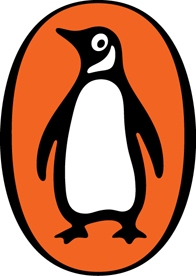



David Crystal was born in 1941 and spent the early years of his life in Holyhead, North Wales. He went to St Marys College, Liverpool, and University College London, where he read English and obtained his Ph.D. in 1966. He became a lecturer in linguistics at University College, Bangor, and from 1965 to 1985 was at the University of Reading, where he was Professor of Linguistic Science. He is Honorary Professor of Linguistics at the University of Wales, Bangor, and a past president of the Society of Indexers. In 1995 he was awarded the OBE for services to the English language. He has published over ninety books, including The Stories of English (2004), also published by Penguin.
Ben Crystal graduated in English Language and Linguistics from Lancaster University in 1998, then trained as an actor at Drama Studio London. His theatre roles include Ernst in Spring Awakening (Bath Theatre Royal), Mozart in Donna Elviras Revenge (Riverside Studios, London), and staged readings at Shakespeares Globe and the Old Vic. He also takes part in literary performances with his father, especially based on Shakespeare. Television and film work includes Starting Out, The Bill, Holby City and Uprising (Warner Brothers, 2001). His audio work includes recordings for the Royal National Institute for the Blind (RNIB) and narration for Channel 4. A screenplay, Blue Sky, received an art-house release in 2002.
A series of four programmes, based on Shakespeares Words, was recorded by the authors for the RNIB in 2003. The full database of quotations from which this book derived its illustrations, is located at www.shakespeareswords.com.
PENGUIN BOOKS
Shakespeares Words is one of the very few works of reference that deserves a place on the shelves of all Shakespeare lovers and for that matter all lovers of the English language. In all too many cases explanation of Shakespeares words both those that have become obsolete and those that have changed in meaning have been passed down from editor to editor since the nineteenth century. David and Ben Crystal, by contrast, have returned to first principles and in so doing produced the most comprehensive guide to Shakespeares astonishing linguistic inventiveness that has ever been compiled Professor Jonathan Bate, author of The Genius of Shakespeare
A fascinating place to browse it takes into account all kinds of scholarly developments [The authors] have carried out their work admirably. Their procedures are clear and helpful The strongest impression you carry away from Shakespeares Words is how rich his language is John Gross, author of After Shakespeare, Sunday Telegraph
This is what everybody who loves Shakespeare amateur or professional has been looking for. A clear and accurate guide to the astonishing vocabulary of the worlds number one writer an inexhaustible feast of illumination Michael Wood, historian and broadcaster
Magnificent a huge work of user-friendly scholarship When foxed and flummoxed, theres nothing for it but this excellent glossary Economist
Fascinating this splendid book will be the trusted companion of students, teachers and editors of Shakespeare for decades to come, and the foundation on which all future Shakespeare dictionaries will be obliged to build Shakespeares Words will have a vital part to play in returning our attention to the texts as dramatic poetry, as startling masterpieces of form and phrasing Kiernan Ryan, The Times Higher Education Supplement
The appearance of a comprehensive and up-to-date glossary of Shakespeare will be greeted with rejoicing by Shakespeare students and scholars all over the world. Throughout the twentieth century anyone concerned with Shakespeares language has had to rely essentially on out-of-date works deriving from the nineteenth century. A standard work of reference has been Alexander Schmidts two-volume Shakespeare-Lexicon and Quotation Dictionary dating from as far back as 1874, reprinted as recently as 1987 and still in print. A product of German philological scholarship, it contains over 50,000 quotations illustrating verbal usages, and is still of value, especially to editors. But Schmidts work, rooted in the scholarship of its day, was completed without the benefit of the great Oxford English Dictionary, conceived in 1857 but which began to appear only in 1884, by which time the editors had got as far as ant. The dictionary crawled to completion only in 1928, since when there have been a number of supplementary volumes. One of the compilers of the OED was Charles Talbot Onions (187365), but his handy Shakespeare Glossary appeared in 1911, well before the parent work was completed. His glossary, too, to which the Crystals pay tribute, is still in print, in the not very comprehensive revision by Robert D. Eagleson of 1986.
In the long period since the origination of Schmidts and Onionss works, attitudes to Shakespeares text and to his language have changed, his readership has broadened, and the needs of readers have evolved alongside changes in the English language itself. At the same time great strides have been made in the study of Shakespeares language. Freudian-influenced criticism has revealed layers of wordplay unsuspected by the Victorians. Specialized areas of Shakespeares vocabulary, such as his use of sea terms, of legal, military and theatrical terminology, of proverbs, oaths, and the Bible, have been subjected to close scrutiny. Eric Partridges pioneering Shakespeares Bawdy, first printed in a limited edition in 1947 and also still in print, has been followed by other studies of what one critic called the less decent language of Shakespeares time which had been largely neglected by the compilers of OED, most recently and most valuably by Gordon Williamss three-volume Dictionary of Sexual Language and Imagery in Shakespearean and Stuart Literature (1997) and its offshoot A Glossary of Shakespeares Sexual Language (1998).
During this period too, generations of scholarly editors and critics have diligently investigated the connotations and registers of particular words and groups of words, and the Shakespeare canon itself has enlarged with the addition of the collaborative play The Two Noble Kinsmen and of Edward III, parts at least of which are now generally allowed to have been written by Shakespeare. The preparation of an easily accessible and comprehensive reference work which would subsume these studies has long been devoutly to be wished, and the heroic task undertaken by David and Ben Crystal the one an eminent linguist and lexicographer, the other an actor as well as a scholar, bringing with him a theatrical perspective fills a yawning gap in Shakespeare reference shelves. And it is no mere clone of earlier works of the kind. Its innovative features bear witness to the freshness of thought that has gone into it. The list of one hundred Frequently Encountered Words provides an excellent basic foundation for the beginner. The glossary panels devoted to areas of the text such as Stage directions, Greetings, Money, and Archaisms form quick-reference guides to specific topics; some of them, such as those on Verb forms and Comparison, Functional shifts, and Plurals even extend to grammatical usage, though the authors disclaim any overall attempt to explicate Shakespearian grammar. Most original of all are the Shakespearian Circles which go well beyond the authors basic remit in providing diagrammatic representations of the circles in which various groups of characters in the plays move. Acting as supplements to the conventional character lists, these, with their accompanying plot synopses, offer help with the interlocking worlds of each play. It is fascinating to see how complex are the circles of some plays, such as
Font size:
Interval:
Bookmark:
Similar books «Shakespeare’s Words»
Look at similar books to Shakespeare’s Words. We have selected literature similar in name and meaning in the hope of providing readers with more options to find new, interesting, not yet read works.
Discussion, reviews of the book Shakespeare’s Words and just readers' own opinions. Leave your comments, write what you think about the work, its meaning or the main characters. Specify what exactly you liked and what you didn't like, and why you think so.

